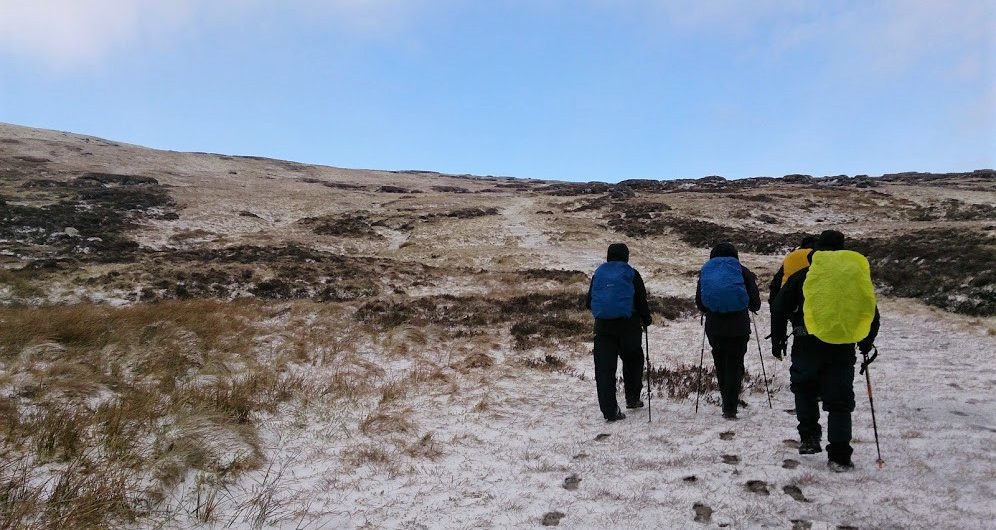When is it the right time to turn back?

There is an old mountaineering saying, ‘The best decision you will ever make is the one to turn back’, and it is often true. To make this crucial call there are a number of criteria that must considered, and here I have outlined those I feel to be the most important.
Weather Conditions
The prevailing weather conditions are a crucial factor when considering whether to continue or turn back. What is the weather like now, how will it change as you continue the ascent, what will it be like on the descent?
High winds are a game changer in the mountains, having a profound effect on safety and morale. What is the strength of the wind, how will this change as you ascend, will you become more or less exposed to it if you continue?
Strong winds, (those over 50-60km/hr), are going to slow your progress, and will significantly increase the risk of you being blown over and perhaps injured. In addition, walking into a strong headwind for a number of hours will sap both your energy and morale. Remember that the wind will strengthen as you gain height and can be more severe over saddles and at the top of corries.
The temperature is also an important factor to consider. As you gain height the temperature drops by approximately 1.0 C for every 100 metres of ascent, so if it is 1 or 2°C in the valley it could well be -10°C on the upper slopes of Carrauntoohil, for example. If it is a cold day, then coupled with the wind, you may have a considerable wind-chill to take into account. Do not underestimate this, on a day when it might be -5°C on the mountain, a strong wind can give a wind-chill of -15°C or more, stripping heat away from your body very quickly.
Precipitation can add significantly to the chilling effects of the wind and cold, soaking gloves and hands and leaking through waterproof clothing to wet the layers beneath. Perhaps not so obvious at first, snow is less of a problem than rain or sleet.
Is it raining, or is it likely to rain soon?

Effective Equipment & Clothing
Do you have effective equipment and clothing to deal with the conditions anticipated? Your boots should be suitable for the terrain you are on, sturdy and waterproof boots with good grip are essential for the uplands of Ireland and Britain.
Is your waterproof clothing going to keep you warm and dry in heavy rain? Wet clothes can result in you loosing up to 20 times more heat than when you are dry. You should have enough warm layers, either in your pack or being worn, to cope with the conditions, as well as a warm hat and gloves, plus spares.
Physical & Mental Condition
How are you and your companions feeling? Are you tired, hungry, cold, dispirited or exhausted? Maybe you are feeling strong, in good spirits and ready for the challenge. You should also ensure you have enough high calorie food to last the day, to keep your energy levels up. Be honest with yourself and consider are you able to continue with the hike as planned.
Time
Think about how long it might be before you reach more comfortable terrain and more sheltered conditions, down in the valley or perhaps under the cover of crags or trees.
If you did a route card when planning the hike, monitor your real progress against that predicted, check if you are on time or well behind the clock. If you continue on, consider how much time you have before it begins to get dark. Do you have the time to get down in the daylight, and do you have a torch in case you get caught out in the dark?

Implications of an incident
All of the factors above will have a bearing on how you might manage an incident, should one occur. If you have an enforced stop due to injury or illness could you cope until help arrives, given the weather conditions you find yourself in?
Finally, think about changing your route if the circumstances dictate, perhaps you can do the hike in reverse and keep the wind at your back when on higher ground. If you are already committed to the hike then remember to have your escape route(s) planned and be prepared to use it if things get tough, or you get behind on time.
There is another commonly used mountaineering phrase, ‘If you think it’s time to turn back, then it probably is’. If your gut feeling is that something is not right then give some thought to the above, change your plans if necessary, and stay safe.
Russ Mills runs Mountaintrails.ie, specialising in guided hiking and mountain skills training, and based in Dublin, Ireland.
